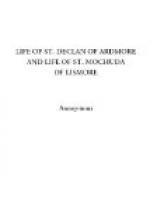On another occasion two British monks of Mochuda’s monastery had a conversation in secret. Mochuda, they said, is very old though there is no immediate appearance of approaching death—and there is no doubt that his equal in virtue or good works will never be found—therefore if he were out of the way one of us might succeed him. Let us then kill him as there is no likelihood of his natural death within a reasonable time. They resolved therefore to drown him in the river towards close of the following night and to conceal all traces so that the crime could never be discovered. They found him subsequently in a lonely place where he was accustomed to pray. They bound him tightly and carried him between them on their shoulders to the water. On their way to the river they met one of the monks who used to walk around the cemetery every night. He said to them: “What is that you carry?” They replied that it was portion of the monastic washing which they were taking to the river. He however, under the insistent suggestion of the Holy Spirit, believed them not. He said: “Put down your load till we examine it.” They were constrained to obey and the burden proved to be—Mochuda. The monk who detected [the proposed murder] was the overseer of the homestead. He said mournfully, “My God, it is a dreadful work you are about.” Mochuda said gently:—“Son, it were well for me had that been done to me for I should now be numbered among the holy martyrs. And it were bad for them (the two wicked monks) for it is with Judas the betrayer of his Lord they should be tortured for ever, who had desired my death for their own advancement. Neither these wretched men themselves nor anyone of their nation shall be my coarb for ever, but my successors shall be of his race through whom God has rescued me. Moreover my city shall never be without men of the British race who will be butts and laughing-stocks and serve no useful purpose.” The person who saved Mochuda was of the Ciarraighe race and it is of that same people that the coarbs and successors of Mochuda have commonly been ever since. [See note 2.]




